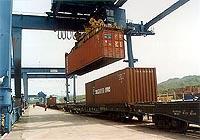
RUSSIA: Meeting in Moscow on April 29, RZD’s Scientific & Technical Council endorsed plans to improve the efficiency of container transport, notably transit shipments on the Trans-Siberian landbridge. According to the railway, achieving international quality standards for container transport is one of RZD’s strategic priorities. Although freight volumes have fallen sharply in its traditional markets, RZD believes that there is a major opportunity to increase transit flows and attract business to rail, boosting revenue at a critical time.
RZD and its subsidiary TransContainer have already introduced block trains operating on tight schedules over distances of up to 9 000 km. At present the best journey times from the east coast ports to the western border via the Trans-Siberian corridor are around 12 days, but the railway believes that to achieve a substantial share of the Eurasian container market this time needs to be cut to seven days.
The 'Trans-Siberian in Seven Days' programme adopted by RZD earlier this year envisages the investment of 11bn over the next five years to accelerate freight traffic over the corridor. Departmental managers and divisional railway operators have now been instructed to implement a programme of measures to raise the average speed for container trains using the landbridge corridor.
At present trains are typically covering around 900 km per day, at a maximum speed of 80 km/h. By the end of this year the intention is that trains should be able to average 1 100 km/day. With the operating speed being increased to 90 km/h in 2010-12, the average will increase to 1 400 km/day, and a target of 1 500 km/day has been set for 2015, when 100 km/h operation will become possible on major sections of the route.
According to RZD, the projected operating revenue from the faster container services (excluding wagon leasing charges) is put at 9bn roubles/year from 2015 onwards. The railway believes that the initial investment will be paid off from increased revenues over about 10 years.

















